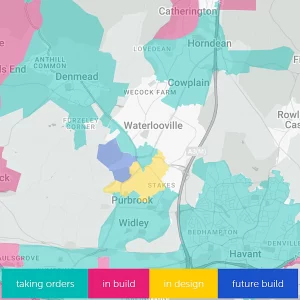Sponsored Links
EU / UK Governments Moot Future of Broadband
Posted: 21st Oct, 2008 By: MarkJ
The Centre for European Policy Studies (CEPS) is due to publish a new paper this week that looks set to damn the increasingly "net neutrality" friendly approach to broadband Internet access being put forward by Europe's leaders.
Network Neutrality is essentially a principle that seeks to prevent broadband access from becoming too restrictive. That is to say, a truly neutral network would not restrict your access to specific online content or services (traffic management) and allow equality of access for all.
However the CEPS report is expected to adopt a different stance, warning that neutrality could limit the incentives for ISPs to invest in future networks, allow content providers a "free ride" and effectively means that average Internet users would be subsiding heavy users.
Naturally the paper has yet to be published and it is difficult to analyse without being able to view the full scope of its arguments, which on the surface would appear to be deeply flawed. For example, content providers do not get a free ride because content is precisely what the Internet is all about it, without that you have nothing.
However it is also true to say that a totally neutral and unrestricted network is simply not possible, especially in the modern climate where downloads of large games, music and videos has become common place. Indeed many UK ISPs already place restrictions on how much you can download in a month and at what speed certain services may be accessed.
To put things in perspective, if every UK broadband user tried to download 100 GigaByte's (GB) in a single month then the price you'd need to pay for all that bandwidth would balance more towards the £80 to £100 per month mark.
That's a far cry from the £15 to £20 per month that most of us fork out because broadband is a shared service, where ISPs quite naturally balance an average pricing level between light and heavy users on their service. This is not a bad thing; it's merely basic economics as used by many different services.
Still, the crux of the CEPS report appears to be that if present EU policy is followed then consumers could end paying more for their broadband connections. That is to say, if you download more then your bills should be higher, which to be quite frank seems perfectly fair.
What is so unfair about ISPs asking customers to pay more if they start using more? Well nothing really, the main problem here is that some of the markets largest players don't want to do it. It's understandable, the super cheap model that allows precious little room for investment also makes them very attractive to consumers.
It seems that many of the biggest market players would rather control the Internet than balance pricing to match demand, a slightly twisted ideology to say the least but we can at least appreciate the commercial and competitive reasoning.
In related news Lord Stephen Carter, the former Ofcom chief whom has since become a minister for communications, technology and broadcasting in the House of Lords, has just announced a new Digital Britain review to be published in six months time.
Information and Communications Technologies and Broadcasting account for 5.9% of UK GDP, £52 billion-plus of turnover and 500,000 jobs. Indirectly they are critical to every business in the economy and to people's quality of life.
The review will look at a number of things from the security and safety of users on the Internet to a workable approach towards promoting content standards. It will also look at broadband development, specifically examining options for maximising participation and levels of service across the UK (getting those that aren't hooked up already connected).
Network Neutrality is essentially a principle that seeks to prevent broadband access from becoming too restrictive. That is to say, a truly neutral network would not restrict your access to specific online content or services (traffic management) and allow equality of access for all.
However the CEPS report is expected to adopt a different stance, warning that neutrality could limit the incentives for ISPs to invest in future networks, allow content providers a "free ride" and effectively means that average Internet users would be subsiding heavy users.
Naturally the paper has yet to be published and it is difficult to analyse without being able to view the full scope of its arguments, which on the surface would appear to be deeply flawed. For example, content providers do not get a free ride because content is precisely what the Internet is all about it, without that you have nothing.
However it is also true to say that a totally neutral and unrestricted network is simply not possible, especially in the modern climate where downloads of large games, music and videos has become common place. Indeed many UK ISPs already place restrictions on how much you can download in a month and at what speed certain services may be accessed.
To put things in perspective, if every UK broadband user tried to download 100 GigaByte's (GB) in a single month then the price you'd need to pay for all that bandwidth would balance more towards the £80 to £100 per month mark.
That's a far cry from the £15 to £20 per month that most of us fork out because broadband is a shared service, where ISPs quite naturally balance an average pricing level between light and heavy users on their service. This is not a bad thing; it's merely basic economics as used by many different services.
Still, the crux of the CEPS report appears to be that if present EU policy is followed then consumers could end paying more for their broadband connections. That is to say, if you download more then your bills should be higher, which to be quite frank seems perfectly fair.
What is so unfair about ISPs asking customers to pay more if they start using more? Well nothing really, the main problem here is that some of the markets largest players don't want to do it. It's understandable, the super cheap model that allows precious little room for investment also makes them very attractive to consumers.
It seems that many of the biggest market players would rather control the Internet than balance pricing to match demand, a slightly twisted ideology to say the least but we can at least appreciate the commercial and competitive reasoning.
In related news Lord Stephen Carter, the former Ofcom chief whom has since become a minister for communications, technology and broadcasting in the House of Lords, has just announced a new Digital Britain review to be published in six months time.
Information and Communications Technologies and Broadcasting account for 5.9% of UK GDP, £52 billion-plus of turnover and 500,000 jobs. Indirectly they are critical to every business in the economy and to people's quality of life.
The review will look at a number of things from the security and safety of users on the Internet to a workable approach towards promoting content standards. It will also look at broadband development, specifically examining options for maximising participation and levels of service across the UK (getting those that aren't hooked up already connected).
Search ISP News
Search ISP Listings
Search ISP Reviews
Latest UK ISP News








Cheap BIG ISPs for 100Mbps+
150,000+ Customers | View More ISPs
Cheapest ISPs for 100Mbps+
Modest Availability | View More ISPs
Latest UK ISP News
Helpful ISP Guides and Tips
Sponsored Links
The Top 15 Category Tags
- FTTP (6799)
- BT (3881)
- Politics (3075)
- Business (2767)
- Openreach (2663)
- Building Digital UK (2512)
- Mobile Broadband (2475)
- FTTC (2142)
- Statistics (2128)
- 4G (2092)
- Virgin Media (2024)
- Ofcom Regulation (1779)
- 5G (1732)
- Fibre Optic (1604)
- Wireless Internet (1595)
Sponsored
Copyright © 1999 to Present - ISPreview.co.uk - All Rights Reserved - Terms , Privacy and Cookie Policy , Links , Website Rules






























